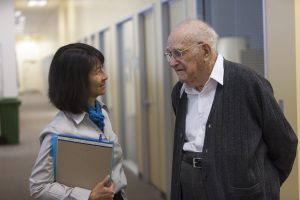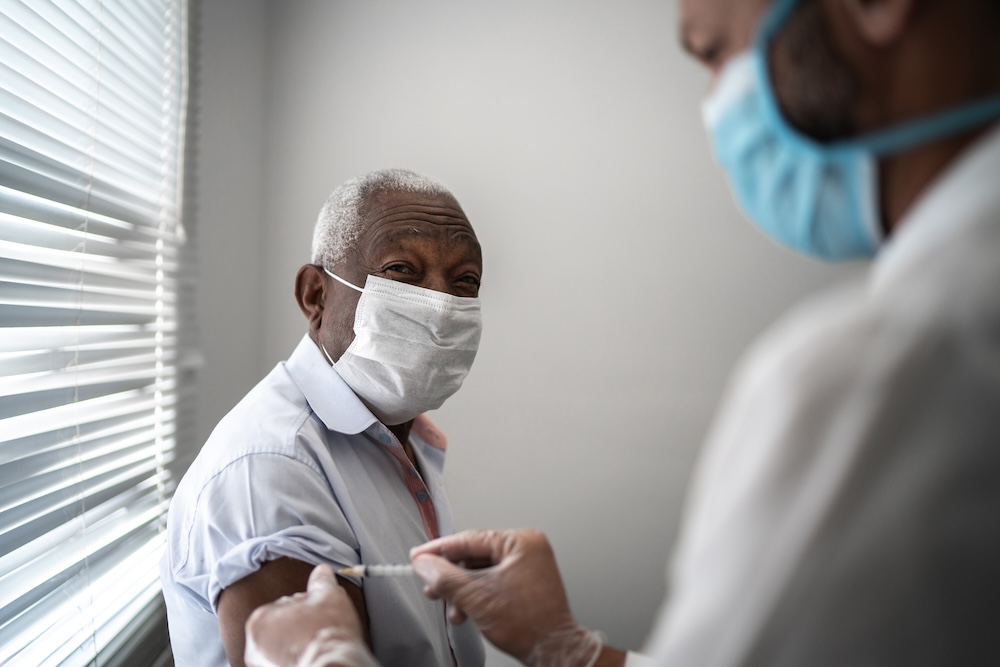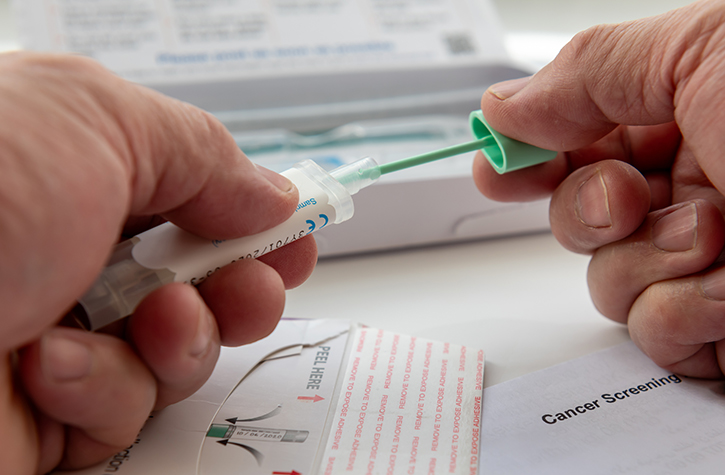August 12, 2024
In academia, theory and practice may stand at odds; in health care research they lean on each other. At the Kaiser Permanente Division of Research (DOR), investigators balance the more theoretical, data-oriented work of epidemiology with the more practice-focused questions of delivering care to patients — delivery science.

Dr. Lieu at her desk in the previous DOR headquarters in Oakland.
After Tracy Lieu, MD, MPH, took over as DOR director in 2012, delivery science became formalized, with the establishment of a robust delivery science program, new research fellowships, specialized grants, rapid analytics projects, a physician researcher program, expanded mentorship, and more.
“Tracy’s leadership has been transformative for the Division of Research,” said Doug Corley, MD, PhD, a DOR research scientist and chief research officer for The Permanente Medical Group (TPMG). “She transformed the structure and processes at all levels to respond to new challenges in science, and fostered the culture to be innovative, nurturing, and supportive.”
Dr. Lieu steps down this month as director after 12 years leading a group that is unique in American health services research — a laboratory where theory and practice mix in exciting ways, and promising ideas can be tested out almost immediately in a large, diverse, learning health care system.
Michael Silverberg, PhD, MPH, longtime DOR senior researcher, will serve as interim director while a national search continues for Dr. Lieu’s successor. Dr. Silverberg is also associate director of DOR’s Behavioral Health, Aging and Infectious Diseases Section and an HIV epidemiologist.
Dr. Lieu’s accomplishments built on momentum from previous DOR leaders and collaboration with clinical partners at TPMG. These leaders recognized the unique strength of a symbiotic relationship between clinicians and researchers, producing patient-centered insights neither could achieve alone.
“When she became director, the delivery science program did not exist,” Dr. Corley recalled. “It was part of her vision when she arrived. And it was the start of increased engagement with TPMG clinicians and leadership for projects that are a bridge between research and informing clinical operations.”
From the TPMG perspective, the growing partnership with DOR has provided both deepened evidence-based practice and enhanced its reputation through successful research-enhanced quality improvement initiatives, said Yi-Fen (Irene) Chen, MD, who worked closely with Dr. Lieu while serving as TPMG’s associate executive director overseeing research from 2018 to 2023.
“We’ve been able to ask questions about how implementing a change in operations might impact our health outcomes,” Dr. Chen said. “Tracy has helped us translate that very well, to help operational leaders frame a research question, to help researchers focus on the most impactful questions, and to get the work funded. She is also a strategic thinker, and has helped us identify key strategic focus areas, such as population health, clinical trials, predictive analytics, and telehealth.”
Dr. Chen pointed to DOR’s growth in the past 12 years: from 44 research scientists to 67; total funding from $96 million to $133 million. DOR’s funding is balanced among federal sources, internal Kaiser Permanente grants, foundations, and industry.
“Part of what changed as we developed the partnership with TPMG, and deepened our delivery science program, was an increase in strategic investment by Kaiser Permanente that allowed for faster turnaround on questions important to the organization,” Dr. Lieu said. “We’re extremely grateful for the robust support from our organization.”
At the same time, she noted that DOR’s research business model relies on the ability of DOR researchers and their teams to successfully compete for external grants and contracts, especially from NIH and other federal sponsors. “Our researchers bring in $2 in external funding for every $1 of internal funding invested, and epidemiology as well as delivery science is integral to our mission,” she observed.
DOR to Harvard to DOR
After growing up in Los Angeles, Dr. Lieu earned her bachelor’s degree in psychobiology at UCLA, her medical degree at the University of California, San Francisco, and her master’s in public health at UC Berkeley. Her pediatrics residency was at Children’s Hospital of Philadelphia, and she returned to California for a Robert Wood Johnson Clinical Scholarship at UCSF.
“My earliest research mentors were an internist and a pediatrician — they were both clinicians who were interested in using research in a very practical way to improve the delivery of care,” Dr. Lieu recalls.
She came to DOR initially in 1993 as a research scientist focusing on cost effectiveness of pediatric care and vaccination. “I joined DOR in part because it was exciting to think that outcomes research could be done in a setting with a very large population,” Dr. Lieu said.
After 6 years at DOR, Dr. Lieu next took an opportunity at Harvard Medical School, serving as a professor in the Department of Population Medicine, director of faculty development, and founding director of the Center for Child Health Care Studies.

Dr. Lieu with former TPMG Associate Executive Director Philip Madvig, MD.
In 2012, when she returned to DOR as its fifth director over a 50-year history, Dr. Lieu had well-developed plans for moving the organization forward, in partnership with TPMG. She worked with then-TPMG associate executive director Philip Madvig, MD, to establish the delivery science program, which later evolved into the Delivery Science and Applied Research program led by Dr. Corley as its regional medical director.
One of the first initiatives under the delivery science umbrella was the Delivery Science Fellowship program; under the leadership of research scientists Richard Grant, MD, MPH, Julie Schmittdiel, PhD, MA, and now Esti Iturralde, PhD, the program has recruited more than 40 fellows. Specialized grants were also established to support delivery science work.
Additional early delivery science initiatives were the Rapid Analytics Unit, which takes up urgent health questions important to TPMG operations and turns them around quickly, and a sister initiative called the Targeted Analysis Program. “A few years into my tenure, Phil Madvig looked over and said, this is all good, but the process of writing up a grant proposal and getting it funded is too slow for every small project we would like to be doing, and that’s how we initiated rapid analytics,” Dr. Lieu recalls.
The Systems Research Initiative in predictive analytics led by Gabriel Escobar, MD, and Vinnie Liu, MD, MSc, and the Rapid Analytics Unit were particularly crucial when the COVID-19 virus turned the world upside-down in March 2020. Fast action was required in every area of health care delivery and research, from evaluating treatments and vaccines to developing prediction models that allowed hospital leaders to manage surges of very sick patients.
“Our delivery science apparatus allowed us to bring our researchers and programmers and clinician leaders together to figure out how we’re going to answer those questions really quickly and contribute to the literature all at the same time,” said Dr. Schmittdiel, who is also DOR associate director of health care delivery and policy. “And the mentorship culture and collegiality that blossomed under her leadership helped us get through that disruptive period as a community.”
Mentoring broadened, deepened
Aside from emergencies, longer-term strategies to strengthen DOR’s culture of collaboration were also begun during Dr. Lieu’s tenure. The Physician Researcher Program invites clinicians interested in research to spend half their time at DOR and half continuing to practice. This program, established in 2015 by Dr. Corley with Dr. Lieu’s support, has hosted 13 physician researchers and is currently recruiting its next cohort.
Dr. Lieu also recognized the value of building researchers from the ground up, both through expanded fellowship programs in multiple fields of research, and through mentorship of early career investigators by colleagues more senior in the topic. This approach takes time but has already produced investigators in several fields — predictive analytics, autism, HIV, maternal health — whose careers were launched with a solid foundation of funding and guidance.
And, importantly, the mentorship approach was applied to other professionals within DOR, including programmers and project managers.
“Under Tracy, the mentorship programs were completely restructured so that each person has a mentor and a path, and so that there is training development support for nearly everyone in the DOR community,” Dr. Corley said. “Tracy has developed it as a community that cares about people at all levels. DOR has a culture that is innovative and collaborative.”
Dr. Lieu’s focus on mentorship made it easier to recruit postdocs and offer them a supportive experience, said Dr. Schmittdiel. “Her vision was that we need to foster the next generation in a really systematic way that leverages all of our expertise across the organization and teaches people about the value of working within a learning health system from day one,” Dr. Schmittdiel said. “And people we have trained have gone on to careers both at DOR and other prestigious places across the country. Tracy started all of that.”
Dr. Lieu initiated changes to the internal structure of DOR, organizing researchers into sections by topic rather than split in two methodologic groups: epidemiologists and health services researchers. This encouraged researchers to work on questions ranging from the causes of health and disease to the best ways of delivering care, and researchers working on similar topics could collaborate.
For DOR’s investigators, the opportunity to see ideas move from the research journal page to patient care is invigorating, Dr. Corley says. “In a lot of places, you do research, you publish it, and you hope that someone somewhere will use it. What Tracy was trying to do was to be able to identify questions that are of interest to clinicians or operational leaders, answer those questions, and then see them translated and inform clinical care.
“It’s kind of the dream for anyone who does research, like, wow, what you’re doing is actually going to change care,” Corley added. “She put together a very thoughtful structure that allowed that to happen.”
Dr. Lieu oversaw DOR during pivotal years of challenge and change, including the COVID-19 pandemic, major shifts in 600 staff members’ work locations, and calls for greater awareness of racial equity both in the research process and in the workplace. DOR established a health equity research portfolio, with targeted funding, and named an Equity, Inclusion & Diversity Task Force.
Next steps for Dr. Lieu
During her directorship, Dr. Lieu continued to carry out health services research, publishing on topics such as management of physicians’ electronic inboxes and strategies for virtual care. She has continued her clinical work as a pediatrician, seeing young patients every Friday morning in the KP Oakland Medical Center.
She serves as a professor of health systems science for the Bernard J. Tyson Kaiser Permanente School of Medicine and is an affiliate professor of epidemiology and biostatistics at UC San Francisco.

Dr. Lieu and DOR Founder Morris F. Collen, MD, who passed away in 2014.
Going forward, Dr. Lieu plans to continue working as a pediatrician and collaborating with DOR research scientist Mary Reed, DrPH, on studies to support TPMG’s Virtual Care team. She also will serve as an advisor for research sponsored by the KP Northern California regional medical education program and supported by DOR’s Biostatistical Consulting Unit. She will continue to serve as a senior editor for JAMA, a role that offers a window into international trends in clinical knowledge and complements her work with TPMG.
“When I first took the DOR director role, Morrie Collen [who founded DOR in 1961] told me, ‘You have the best job in the world,’” Dr. Lieu observed. “It’s been a real delight to work with such talented people throughout our research and clinical communities, and to enjoy the support of organizational leaders who have a vision for how research can help transform health.”
This article originally appeared on Division of Research Spotlight.






